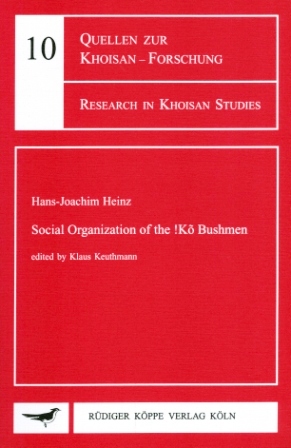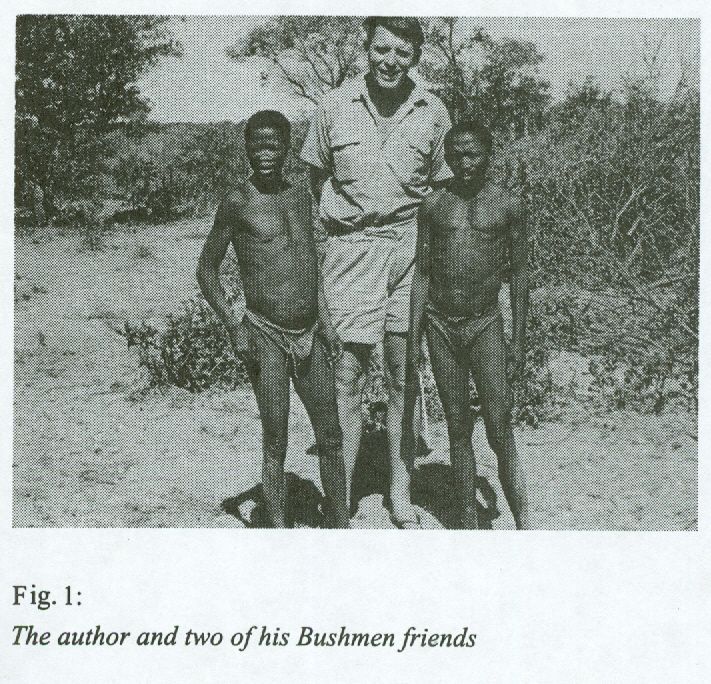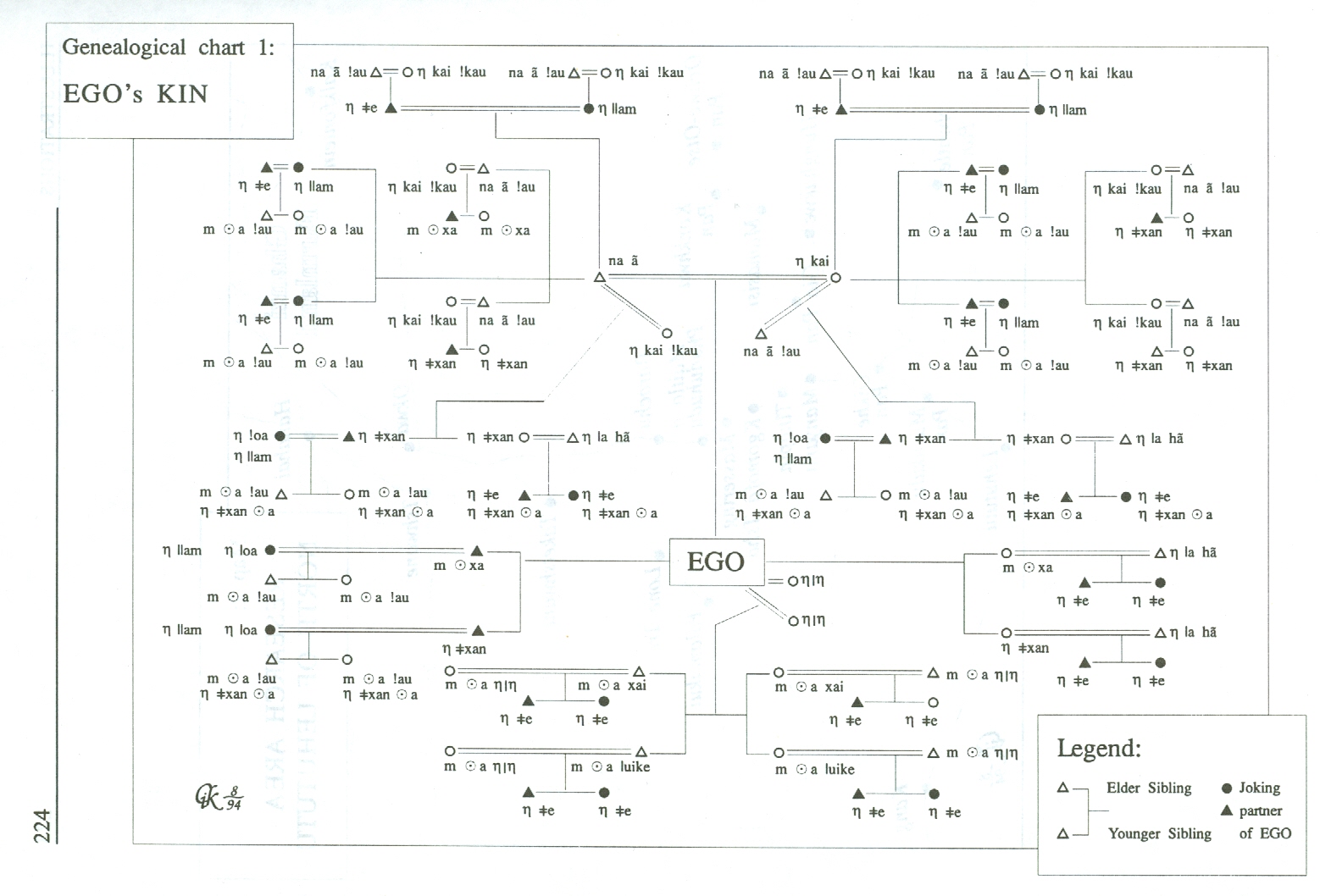


Social Organization of the !Kõ Bushmen
Author: Hans-Joachim Heinz †. Edited by: Klaus Keuthmann. Series edited by: Rainer Voßen.
Series: QKF Research in Khoisan Studies Volume 10
1994225 pp.
2 maps, 8 b/w photos, 3 genealogical charts
Text language(s): English
Format: 160 x 240 mm
370 g
Paperback
€ 39.80
Buy 'Social Organization of the !Kõ Bushmen' as a downloadable PDF document directly from our online shop »
Order 'Social Organization of the !Kõ Bushmen' as print edition »
The book presents a general survey of all aspects of social organization of a Khoisan-speaking hunter-gatherer society living in the Southern Kalahari (Botswana). In international ‘Bushman’ studies, this is the only monographic attempt at such a subject published to date. Apart from a general ethnographic outline, it gives a full description of the social features that constituted !Kõ band society during the time of the field researches in the early 1960s.
Main emphasis is put on ‘primary’ (family, extended family, band and band nexus) and ‘secondary groups’ (age groups, sex groups, economic groups), on ‘kinship’ (including naming and terminology), and on ‘marriage’. In addition, the author reports in detail on the male initiation. Since he was initiated himself, this description based on his own experiences is the most authentic and elaborated one ever recorded on ‘Bushman’ initiations.
The systematic presentation of data and the intimate knowledge which the author gained during 10 years of life with the !Kõ give a particular insight into the society of these Kalahari hunter-gatherers and almost turn this study into a textbook on the social anthropology of Southern African foraging societies.
Obituary for Hans-Joachim Heinz (1917–2000)
Hans-Joachim Heinz, author of The Social Organization of the !Kõ Bushmen and An Ethnological Survey of the Peoples of the Okavango River Delta [...], has fallen a victim to a brutal murder attack late in August 2000. He was stabbed to death at his home in Maun/Botswana while his wife Olga Xoliswa survived the attempt on her life.
His violent death has shocked colleagues all over the world. Even at the end of the eighty-third year of his life, the frailties of age could not bend down the activities of this singular, often self-willed and eccentric, but always enthusiastic character. He was about to complete an autobiography, which he had been working on since the mid-1990ies. As extraordinary as his character was his life.
To present but a few prominent stages of his career (for further details cf. the editor’s introduction to Social Organization of the !Kõ Bushmen and a biographical sketch in the forthcoming Okavango Survey volume): Heinz was born in Leipzig, Germany in 1917. When still a child he moved to the US and lived with his parents in Trenton, New Jersey. After finishing High School, he decided to return to Germany. He worked on a German tramp vessel shovelling coal, and this journey through the Pacific and East Asia in the end lasted for one year. He did not stay for long in Germany, returning to the US to study at Dartmouth College at Hanover, New Hampshire. 1938 he again travelled to Germany to study at Munich University as an exchange student.
At the outbreak of World War II he was called up by the German Wehrmacht, serving as an interpreter. Later he was transferred with a special task force to Sardinia, where he was severely wounded. Even worse than his injuries, he got a typhoid fever and malaria. After the war Heinz took up his studies at Munich University and began his academic life in the field of ethology, submitting a PhD thesis on Konrad Lorenz’ theory of instinct and reflex in 1947 (Vergleichende Betrachtungen über die Putzhandlungen bei Dipteren im allgemeinen und bei Sarcophaga carnaria L. im besonderen).
Due to his special knowledge in entomology, he got his first post in the Institut für Tropenmedizin in Hamburg. He soon left Germany, however, to move to South Africa, where he was offered a position as a parasitologist in the South African Institute for Medical Research and at the Medical School of the Witwatersrand University in 1961. The same year he joined Philip V. Tobias on an expedition to the Central Kalahari, which was organized and funded by the Kalahari Research Committee.
His first encounter with the Bushmen was a crucial experience, sparking his interest in anthropology and he began studying the social organization of the !Xóõ. Based on this data, he submitted a MA thesis in anthropology to the University of South Africa, Pretoria, in 1965. Hans-Joachim Heinz was a man of practical ambitions, and it is small wonder that, as soon as he realized the need for development schemes for the Kalahari Bushmen, he put his research interests aside and worked on programmatic solutions. He thus established livestock rearing at Takatshwane in 1969 and the first Bushman settlement at Bere in 1971.
When Elizabeth Wily, who later became the first Bushman Development Officer in Botswana, arrived at this place as a volunteer teacher in 1972, a series of tremendous arguments between the two passionate characters were exchanged. Their dispute centered on Heinz’s role as the leading figure in the !Xóõ community. This situation was even heated up by permanent conflicts in the Bere settlement, and in 1974 Heinz left the project, exhausted by quarrels and embittered by disillusions.
From this time on, he lived a hard and unsteady life subject to changes in the course of his various enterprises – as, for instance, driving cattle trucks through the Kalahari, or farming at the Thamalakane River near Maun. These ups and downs only came to an end when he was appointed principal of the Wildlife Training Institute in Maun. Organizing and instructing one of Botswana’s first anti-poaching units was amongst his responsibilities at that time. Due to his age, he was finally retired from active service in the mid-90s.
Hans-Joachim Heinz, it is true, was a scintillating personality. Notwithstanding that some aspects in his life, parts of his scientific work and particularly some of his ideas concerning development schemes evoked controversial debates, it is fair to say that his research work must be considered a major contribution to our understanding of Bushman life in the Kalahari.
Klaus Keuthmann, Wachtberg/Germany
Under these links you will find further analyses of the history and social organisation of southern African ethnic groups:
Accompanying material:
- Kalahari and Namib Bushmen in German South West Africa
(ISBN 978-3-89645-146-0 ) - South African |Xam Bushmen Traditions and Their Relationships to Further Khoisan Folklore
(ISBN 978-3-89645-875-9 ) - Southern African Khoisan Kinship Systems
(ISBN 978-3-89645-874-2 ) - The Kalahari Ethnographies (1896–1898) of Siegfried Passarge
(ISBN 978-3-89645-141-5 ) - The San and the Colonization of the Cape 1770–1879
(ISBN 978-3-927620-58-2 )
Cross-reference:
- „For the Power and Glory“
(ISBN 978-3-89645-451-5 ) - „Widerstand und Gottesfurcht“
(ISBN 978-3-89645-059-3 ) - Die „Eingeborenen“ Deutsch-Südwestafrikas
(ISBN 978-3-89645-054-8 ) - Frühe Kolonialgeschichte Namibias, 1880–1930
(ISBN 978-3-89645-058-6 ) - Manasse Tjiseseta, Chief of Omaruru, 1884–1898, Namibia
(ISBN 978-3-89645-055-5 ) - Trommeln in der Kirche
(ISBN 978-3-89645-917-6 )
Reviews
Social Organisation of the !Kõ Bushman fills a large gap in the scholarly literature on the San, and we owe a debt of gratitude to Keuthmann for pursuing its publication and to Hans-Joachim Heinz for finally agreeing to it.
Anthony Traill in African Studies, 54/1, 1995, 126-128
| « back | Print version | [top] |
 Books
Books Audio
Audio Biographies
Biographies Series
Series Festschrifts
Festschrifts Journals
Journals